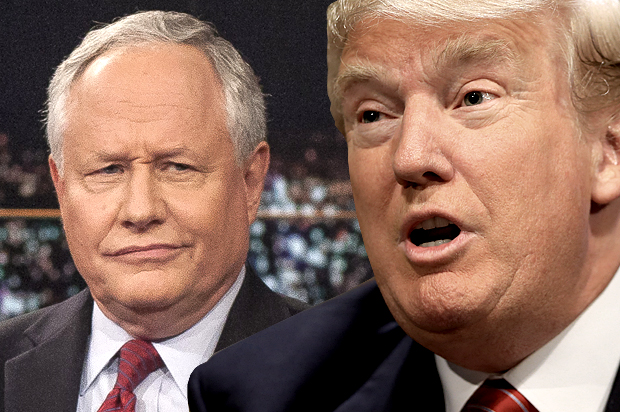It’s hardly surprising, that Breitbart recently referred to William Kristol as a “renegade Jew” in one of its headlines. The conservative website has been shilling pretty hard for Donald Trump over the past year, so it makes sense that the less savory aspects of Trump’s political style would eventually rub off on them.
What is that style, though? Outlets from The Washington Post to The Atlantic have spilled plenty of ink describing The Donald as un-politically correct, but Trump’s rhetoric does more than simply transgress the boundaries of polite conversation. From the moment he launched his presidential campaign until the present, Trump has repeatedly used ethnic labels and stereotypes to both define his opponents and discuss major policy issues. In the process, the Trump movement has trafficked a distinct brand of racial and religious tribalism into American life, one that is entirely comfortable with forgetting about who a person is and instead collectively defining individuals based on what they are.
Take the article about William Kristol. Written by conservative columnist David Horowitz, it attacked Kristol for leading a movement among establishment Republicans to run a third-party candidate, who could then thwart Trump by denying him a majority in the Electoral College. Given how no reference is made to Kristol’s Jewish background until the last paragraph (which feels shoehorned in), one wonders if Horowitz was actually involved in putting “Renegade Jew” in the title. Certainly it can be safely said that Kristol’s background was irrelevant to the article’s main argument. Unfortunately a large segment of Breitbart’s pro-Trump readers is drawn to this kind of inflammatory language… and by referencing how Kristol is Jewish, Breitbart was pandering right to it. As former editor-at-large Ben Shapiro recently wrote, “They’ve become a site that openly panders to alt-right anti-Semitism and soft white supremacism… This began in the pro-Trump comment section at Breitbart while I was there; now, it’s filtered up.”
When Shapiro writes about the “alt right,” he’s referring to the modern white supremacist movement, one that Rosie Gray of BuzzFeed described as “perfectly tailored for our times: 4chan-esque racist rhetoric combined with a tinge of Silicon Valley–flavored philosophizing, all riding on the coattails of the Trump boom.” Although white supremacy has existed for as long as the country itself, white supremacist movements experienced a boom after America elected Barack Obama as its first black president in 2008. Even when this hasn’t led to literal violent extremism (which has also increased in the Obama era), it has still managed to normalize a strain of rhetorically violent racism that had been taboo for quite some time. To the rest of the country, uttering slurs and playing on stereotypes are boorish and should be deplored as hateful; to white supremacists, these actions are courageous and should be celebrated as salvos for racial liberation.
Not surprisingly, this movement overwhelmingly agrees with Trump when he perpetuates long-debunked racist canards, from his support of the birther conspiracy theories (the basis of his 2012 campaign) to his claim that undocumented Mexican immigrants are more likely to be criminals and rapists (a line from his announcement speech for the 2016 campaign). It isn’t just that his wild assertions play right into America’s paranoid political tradition; by blending that with sweeping generalizations about non-whites and non-Christians, he validates underlying prejudices against these minority groups. Indeed, as The Huffington Post pointed out, “virtually every time Trump mentions a minority group, he uses the definite article the, as in ‘the Hispanics,’ ‘the Muslims’ and ‘the blacks.’”
This also explains why so many of Trump’s racist policy proposals are bound by their collectivist assumptions, treating large and diverse groups of people as if they are a single entity. When Trump insists that America build a wall on our Mexican border, it’s to keep out the aforementioned bogeyman of the dangerous illegal alien; when he says he would implement a national database to register Muslims, it’s because he lumps America’s three million Muslims with the handful of violent terrorists; and when he openly opposes the Black Lives Matter movement, it is because he has a history of generalizing black people as having “anger” and being “lazy.” The people supporting these aspects of Trump’s political agenda do so because they share this fundamentally racist worldview – and, presumably, will actively work to help him implement it if he becomes president.
Hence Breitbart’s cheap shot against Kristol. Anti-Semitism – like Islamophobia, xenophobia, and racism – is a popular prejudice among the alt right because it views all the individuals within a non-white group (so to speak) as a monolith. While hatred of Jews hasn’t played a major role in Trump’s campaign (although he has dabbled in it), it still factors heavily into the thinking of his white supremacist supporters. Consequently, when a pro-Trump site decides to attack a leading Republican intellectual who dares oppose their champion, it makes perfect sense that they would dredge his Jewishness into the conversation. It’s a perfect way of signaling others in the alt right that, yes, they truly are one of them. Not only will they support your kind of candidate, but they will do using your kind of language.
While Breitbart’s anti-Semitic headline against Kristol will likely be forgotten, it is an ominous foreshadowing of what is to come. Even if Trump loses this election, he has opened floodgates that it will not be easy to close. The stigma associated with overt bigotry was a powerful disincentive, averting not only offensive language but the real violence that often follows it. Now that that has been weakened, it is quite likely that our divisions will get worse long before they can get better, regardless of whether Trump is still on the scene to stoke the flames.

